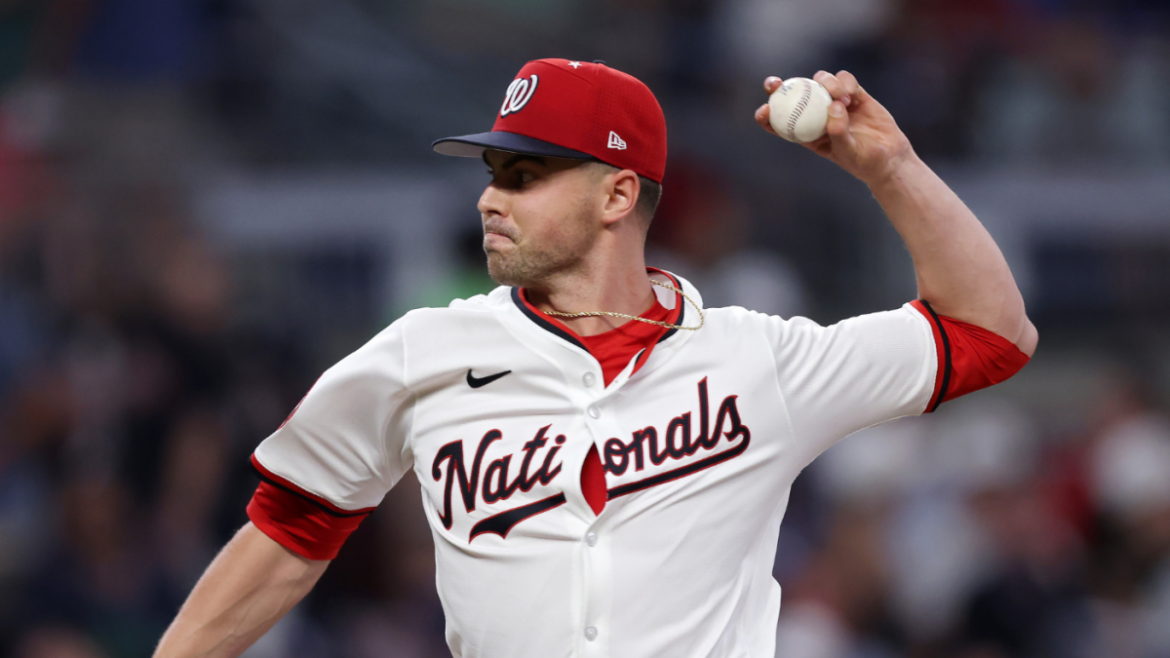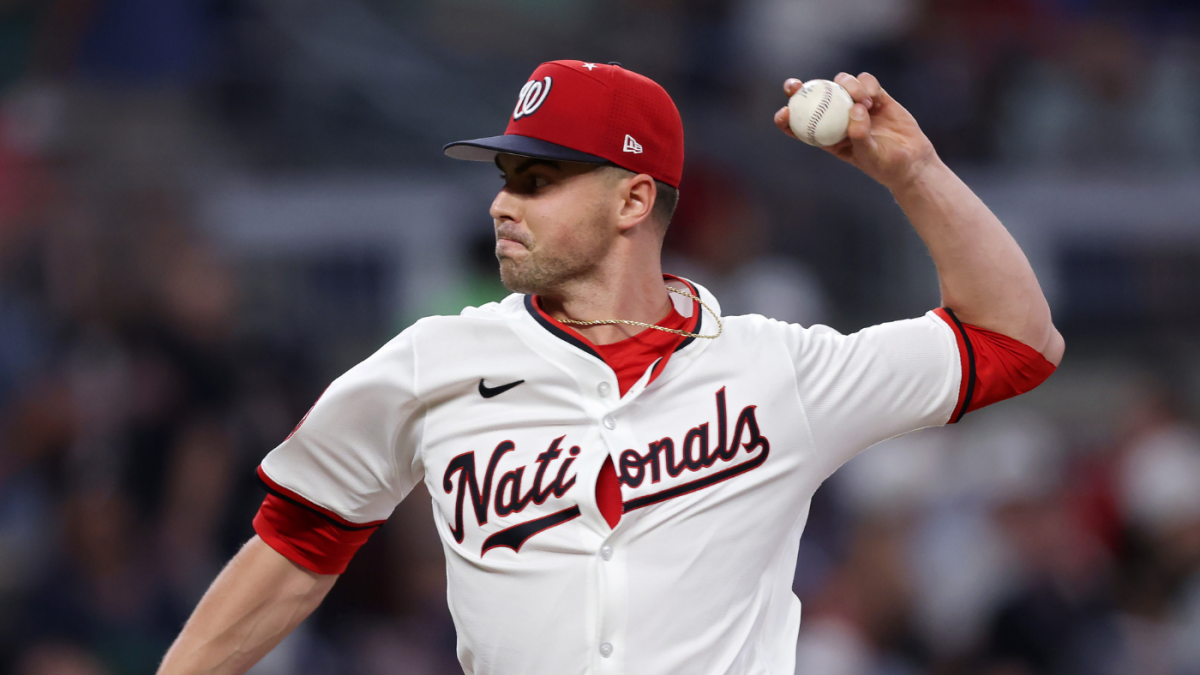The MacKenzie Gore Trade Dilemma: A Strategic Crossroads for the Washington Nationals
Introduction: A Pivotal Decision
The Washington Nationals stand at a critical juncture as the 2025 MLB trade deadline approaches. The team’s surprising competitiveness this season has thrown a wrench into their long-term rebuilding plans, forcing them to confront a difficult question: Should they trade MacKenzie Gore, their emerging ace and one of the most valuable assets in baseball, or build around him as the cornerstone of their future? This decision is not just about one player—it’s about the direction of the franchise. The Nationals must weigh the immediate benefits of trading Gore against the long-term stability and leadership he could provide. This report explores the complexities of this dilemma, analyzing the arguments for and against trading Gore, the potential returns, and the risks associated with each path.
Gore’s Ascent: A Beacon of Hope
MacKenzie Gore’s journey to stardom is a testament to resilience and talent. Once a top prospect with the San Diego Padres, Gore arrived in Washington as part of the Juan Soto trade. After overcoming early struggles, he has blossomed into a legitimate ace, showcasing a combination of velocity, command, and poise that has made him one of the most reliable pitchers in the league. His performance in 2025 has solidified his status as a potential All-Star and a highly sought-after trade asset.
Gore’s emergence is a rare bright spot for the Nationals, who have been in the midst of a rebuild since their championship run in 2019. His presence provides a tangible piece of the puzzle as the team attempts to construct a winning roster. Beyond his on-field contributions, Gore’s leadership and stability are invaluable to a young pitching staff. His ability to anchor the rotation and set an example for younger players makes him a cornerstone of the team’s future.
The Case for Trading Gore: Maximizing Value and Accelerating the Rebuild
Despite Gore’s undeniable value to the Nationals, trading him presents a compelling opportunity to accelerate the team’s rebuild. Several factors make this a viable option:
Peak Value
Gore’s current performance likely represents the highest his trade value will ever be. He is young, healthy, and performing at an All-Star level. Teams in contention are often willing to overpay for such a player, particularly at the trade deadline. The Nationals can capitalize on this peak value to acquire a significant package of prospects, potentially filling multiple holes in their roster.
Addressing Multiple Needs
The Nationals have several areas of need, particularly in the outfield and at second base. Trading Gore could yield a package of prospects that addresses these deficiencies. The team can target high-ceiling players who can contribute to their future success, providing a more balanced and competitive roster.
Risk Mitigation
Pitchers are inherently volatile assets. Injuries are common, and performance can fluctuate wildly. Holding onto Gore carries the risk that his value could decrease due to injury or regression. Trading him now allows the Nationals to capitalize on his current value and avoid these potential pitfalls. It also mitigates the risk of losing him to free agency in the future, as Gore’s team control is not indefinite.
Rebuild Timeline
The Nationals are still in the early stages of their rebuild. While Gore is a valuable piece, he may not align with the team’s long-term timeline. The Nationals could potentially acquire prospects who are closer to the major leagues or who possess higher upside, providing a more immediate path to contention.
The Case Against Trading Gore: Building a Foundation for the Future
Trading MacKenzie Gore would be a significant decision with potentially far-reaching consequences. There are compelling arguments for keeping him in Washington:
Proven Talent
Unlike prospects, Gore is a proven commodity at the major league level. He has demonstrated the ability to pitch effectively against MLB hitters. His value is not based on potential but on actual performance. Keeping him ensures that the Nationals have a reliable ace to build around, providing a stable foundation for their future success.
Leadership and Stability
Gore provides leadership and stability to the Nationals’ pitching staff. He sets an example for younger pitchers and helps to create a winning culture. His presence in the clubhouse is invaluable, particularly for a team in the midst of a rebuild. Trading him could disrupt the team’s chemistry and slow down the development of other young players.
Fan Appeal
Gore has quickly become a fan favorite in Washington. His talent and personality resonate with the fan base. Trading him would likely alienate some fans and could negatively impact attendance and team morale. The Nationals must consider the intangible benefits of keeping a player who has become a symbol of hope for the franchise.
Controllability
Gore has team control for several more seasons, providing the Nationals with cost certainty and flexibility. They can build around him without having to worry about his impending free agency. This controllability is a significant advantage, allowing the team to plan for the future with a reliable anchor in their rotation.
Potential Trade Partners and Return Scenarios
Several teams have reportedly expressed interest in acquiring MacKenzie Gore. The Boston Red Sox, in particular, are seen as a strong suitor. The Red Sox are in playoff contention and are looking to bolster their starting rotation. They have a deep farm system and could offer a package of prospects that would be attractive to the Nationals.
Other potential trade partners include teams like the New York Yankees, looking to add starting pitching depth for a playoff push, and perhaps even a surprise contender willing to mortgage some of their future for a shot at a title run. The Nationals should prioritize acquiring prospects who address their specific needs, including high-offensive potential players who can play in the outfield or at second base, as well as pitchers who are close to the major leagues and who have a high ceiling.
Weighing the Risks: A Delicate Balancing Act
The decision of whether to trade MacKenzie Gore is not an easy one. It requires a careful weighing of the risks and rewards. The Nationals must consider the potential returns, the team’s long-term outlook, and the impact on the fan base.
Trading Gore could accelerate the rebuild and provide the Nationals with a wealth of young talent. However, it also carries the risk of trading away a potential ace and alienating the fan base. Keeping Gore would provide stability and leadership to the pitching staff. However, it also carries the risk that his value could decrease, and the Nationals may miss out on an opportunity to acquire valuable assets.
A Calculated Gamble
Ultimately, the Nationals’ decision will depend on their assessment of Gore’s long-term potential and the quality of the offers they receive. If they believe that Gore is a true ace who can lead them to contention, they should keep him. However, if they are offered a package of prospects that they believe can significantly accelerate the rebuild, they should seriously consider a trade.
The Nationals must also consider the impact on the fan base. Trading Gore would be a difficult decision to explain to fans, but it could be justified if the team is able to acquire a group of exciting young players. The front office must act decisively and strategically to ensure that the team is well-positioned for future success.
Conclusion: A Defining Moment for the Nationals
The MacKenzie Gore trade dilemma represents a defining moment for the Washington Nationals. The decision they make will shape the future of the franchise for years to come. There is no easy answer, and both options carry significant risks and rewards. The Nationals must carefully weigh all the factors and make a decision that is in the best long-term interest of the team. Whether they choose to build around Gore or trade him for a package of prospects, the Nationals’ front office must act decisively and strategically to ensure that the team is well-positioned for future success. This decision will not only impact the team’s competitiveness but also the morale of the fan base and the overall direction of the franchise. The Nationals stand at a crossroads, and the path they choose will define their future.





